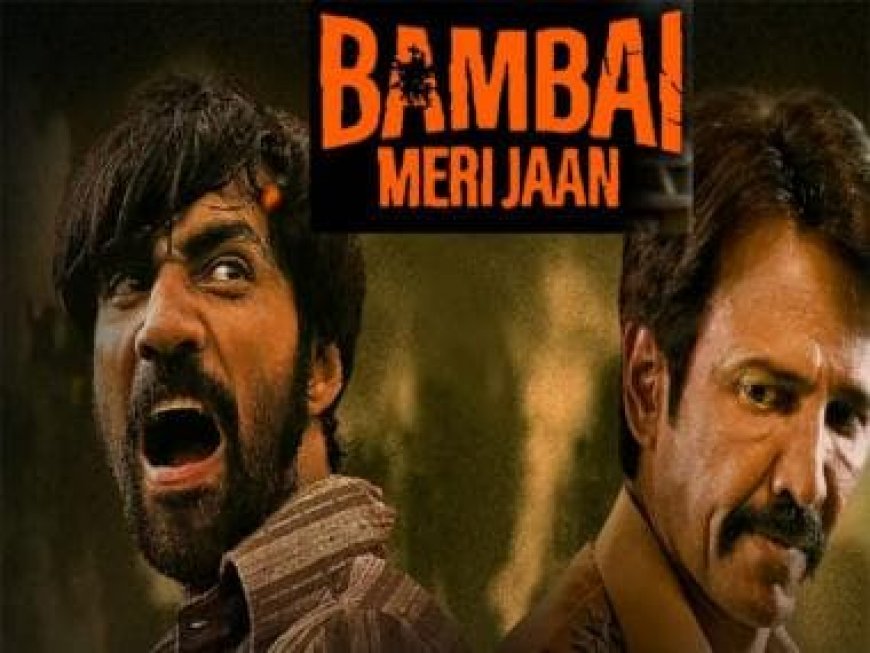Bambai Meri Jan: Dawood Ibrahim & the gangster saga resurfaces in popular imagination
Bambai Meri Jan: Dawood Ibrahim & the gangster saga resurfaces in popular imagination

Bambai Meri Jaan, the latest web series on Prime Video, is a retelling of the rise of Dawood Ibrahim against the entrenched and powerful in Mumbai’s crime world. Shujaat Saudagar (director) and Rensil DSilva (co-creator) of this series have kept the likeness close to real life, and the changes in their names feel perfunctory. Dara is Dawood Ibrahim, Azeem Pathan is Haji Mastan and Anna Mudaliar is Varadarajan Mudaliar. Based on journalist S Hussain Zyadi’s detailed accounts of the era of Dawood Ibrahim, this series is engaging but driven by violence (both verbal and physical). It rests the narrative on the contrast of Ibrahim’s gangster persona to his father, Ismail Kadri, an honest policeman.
For those who have watched tales of Mumbai’s crime world for some time, it might strike as a tweaked version of the same story. But the charm of this tale never seems to wear off. It is like the steady relationship that Hollywood’s filmmakers of the Seventies and late Sixties had with the Italian mafia and its footprint over drugs, guns, and contraband. Dawood Ibrahim and the men that preceded him in controlling crime in Mumbai- Haji Mastan and Karim Lala, also Varadarajan Mudaliar- seem to serve out room for engrossing re-telling for the screen. Most films made on these subjects have worked with audiences, with a few proving to be cult classics over time.
Ram Gopal Varma leads the shift in developing a narrative from real-life-inspired crime films. Satya (1998) told the story of a young man drawn to the glamour and power of gangsters and tracked his downfall. A linear story, it stood out amidst a crowd of melodramatic films of that time because of credible characters. Be it the women in love with gangsters or married to them, their responses were believable and not steeped in an imagined high morality. Amongst the characters that this film immortalized was that of Bhikhu Mhatre, an outstanding performance by Manoj Bajpayee. Varma followed it up with the sophisticated and true-to-life story of the Dawood Ibrahim- Chotta Rajan relationship in Company (2002). Rajan was a protege who became Ibrahim’s most dangerous enemy after a feud, leading to deaths and violence across Mumbai. With Ajay Devgn and a debutante Vivek Oberoi, this film brought a nuanced presentation of the functioning of Mumbai’s criminal underworld at its peak. It also brought an unforgettable performance by Mohanlal as a top cop on the trail of both gangsters.
Varma’s understated and realistic filmmaking style had been a collaborative effort of talented writers and assistants, including the prolific filmmaker Anurag Kashyap. Kashyap has made the grittiest and most authentic gangster docu-drama around the deadly Mumbai serial bomb blasts of 1993 with Black Friday (2004). Mired in controversy around its release, this masterpiece barely got its moment in the spotlight in cinema halls. But it has become a reference point for making a documentary like a true crime film or series. Sans stars, this film doesn’t soften the blow of all that it took to get to the bottom of a blood-soaked, violent, and intense investigation by the Mumbai police to find the perpetrators of this act of terrorism. With fine performances by Kay Kay Menon, Aditya Srivastava, and Pawan Malhotra in a cast of multiple actors, it delved into the complexities that led to the arrests of many. It also looked at the victims of such investigations, never making room for any adjustments or taking sides. The film is available on streaming now (Disney + Hotstar), which is good news for anyone who wants to unpack the complicated Mumbai blasts case.
While Varma and Kashyap made films that stayed close to real people and situations, a heightened filmy story by Milan Luthria also won audiences. Once Upon A Time in Mumbaai (2010) brought a stylized version of the era of Dawood Ibrahim versus Haji Mastan, the classic gangster who had a penchant for stylish objects and women. Ajay Devgn and Emraan Hashmi delivered convincing performances, with Devgn’s portrayal of Mastan being both suave and likable. This film focused on the glamorous pull of crime on the young and poor in Mumbai, where gangsters controlled much of business and showbiz in the past. Like films tend to be, it overstates the hold of gangs in the city’s functioning but it does present the story in a popular framework well. A sequel to his film didn’t work because it didn’t develop the popular fable-like story of these gangsters that had gotten national headlines for a while.
A film that stands out for its intense performance and personalized take on gangs in Mumbai is Mani Ratnam’s Nayakan (1987). A brilliant Kamal Haasan performance drives this fictionalized story of Varadarajan Mudaliar and his rise. It was remade in Hindi as Dayavan (1988) with Vinod Khanna. Not quite as effective as the original, this one also did fairly well because of its star cast, dramatic story, and adaptation of real incidents.
The impact of gangsters from Mumbai’s underworld has been made into films by others like Apoorva Lakhia, where specific incidents are in focus. Dawood’s shadow remains a fringe factor in stories about Mumbai during the late Eighties and Nineties across OTT and cinema. His life and times have become a storytelling device over time.
In today’s era of millennials and Generation Z, the lack of financial prowess or finesse in the crimes that Dawood and his fellow gangsters conduct might not always feel high impact or dangerous. Their hold over Mumbai has lightened over time. But the allure of guns, women, and menacing control over India’s financial and film capital has been a powerful draw because it was visible and almost awe-inspiring for many.
What's Your Reaction?


























































